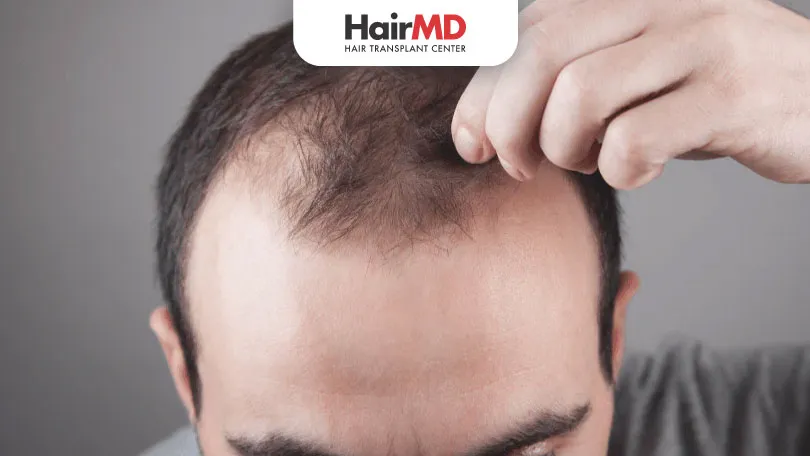3rd September, 2021

Androgenetic alopecia, also termed male pattern baldness, is observed in over 50% of males above the age of 50. However, its extent may vary from person to person.
Baldness is usually part of the aging process of many men; however, it could be distressing for some. Such men would search for androgenetic alopecia treatment and dig more into its causes. So, here’s more to it.
What’s covered in the article?
- Androgenetic Alopecia Causes
- Androgenic Alopecia Stages | Male Pattern Baldness Stages
- Androgenetic Alopecia Treatment in Males
- Treat Androgenetic Alopecia with HairMD
- Conclusion
Androgenetic Alopecia Causes
What causes androgenic alopecia? Hair loss in men is usually the interaction of three factors, age, hormones, and genetics. Male pattern hair loss is generally found in people with a genetic history of baldness. It is associated with a male sex hormone called androgens, one of the functions of which is regulating hair growth.
Every hair on the head has a growth cycle. Pattern baldness affects the growth cycle and shrinks the hair follicles. The result is shorter and more delicate hair strands. When the process continues, hair grows even weaker, and finer, making the hair look thin and the scalp visible, until finally, it leads to the dead hair follicles.
Genetic male pattern baldness does not have side effects as such. However, in some cases, baldness can be associated with causes like thyroid conditions, medications, anabolic steroids, etc. If baldness occurs after taking certain medications, it requires expert advice and medical intervention.
Some other causes of hair loss include malnutrition, iron deficiency, and diabetes. Additionally, infections, stress, etc., can also lead to male pattern baldness over a period of time.
Androgenic Alopecia Stages | Male Pattern
Baldness Stages
Here are the seven stages of male pattern baldness.
1. Hair thinning around the temples. Usually, it is not noticeable.
2. Hair thinning and creation of an M-shaped hairline.
3. Visible balding and receding hairline forming M, V, or a U shape.
4. A significant hair loss at the back of the head.
5. Baldness creates a horseshoe or U-shaped hairline at the scalp’s crown.
6. Enlarged bald patches that expose the scalp.
7. Little thin hair with the hairline now receded to the crown.
Androgenetic Alopecia Treatment in Males
For many, losing hair in the 50s is a natural process, and they don’t feel the need to treat it. However, now it is quite common in the young generation, especially those who have a family history of baldness. Nevertheless, not every individual is the same. For some, their changed looks, especially the bald patches and the receding hairline, can cause stress. But today, a range of possible general hair loss treatment options are available. Here are a few.
Minoxidil:
Minoxidil is a topical treatment applied to the individual’s scalp. It increases the blood flow to the hair follicle. Besides, Finasteride is another effective medication. Both these medication forms are FDA-approved for hair loss.
Transplantation:
If medications fail, a hair transplant is an option. It involves picking hair follicles from non-androgen-dependent areas of the body and grafting them into the scalp.
Shampoos:
Ketoconazole also helps in hair loss .it also has some action of anti-androgen.
Laser and Light Treatment: A laser and light treatment is yet another popular treatment option. It has a specific wavelength that helps in hair growth.
Nano Fat Treatment:
This procedure involves taking fat from your own body, processing it, and deriving stem cells from it. They are further injected into the bald area. The treatment has long-term effects.
PRP:
Platelet Rich Plasma is another potentially useful treatment in treating androgenetic alopecia. It involves separating growth factors from your blood and injecting it into your scalp. The treatment can help heal follicles and strengthen them from which the hair grows.
Treat Androgenetic Alopecia with HairMD
Need a suitable androgenetic alopecia treatment? Choose HairMD. We are a reliable hair loss clinic with proven results and a range of hair loss treatments.
Our options include FUE hair transplantation, the use of minoxidil, nano fat treatment, PRP, and medication according to the condition and the grade of the baldness. We support our treatment options and their effectiveness through regular post-treatment follow-ups. Additionally, we use the latest surgical equipment and leverage our expertise to ensure safe hair transplants and positive results.
Connect with us to know more or book an appointment with our dermatologists.
Do You Know?
Nearly 250 Patients Visit HairMD
Everyday For Various Hair Concerns?
(You are one click away from flawless skin)
Meet Our Dermatologists
Conclusion
In conclusion, androgenetic alopecia, or male pattern baldness, is a common condition driven by genetics, hormones, and age. While it can be distressing, various treatment options like minoxidil, finasteride, PRP therapy, and hair transplants offer hope for managing hair loss. Early intervention and professional guidance can significantly improve outcomes, allowing men to regain confidence and control over their appearance.
Further Reading
Topical Finasteride – A Revolutionary Approach to Hair Loss Treatment
Learn how topical finasteride combats hair loss by reducing DHT levels locally with fewer side effects. Visit HairMD Clinic Pune for expert solutions.
Hair Loss – Could It Be a Sign of a Bigger Health Problem?
Find effective hair regrowth treatments for women. Explore solutions like PRP, medications, and more to combat hair loss with expert advice from HairMD.
Do Hats or Helmets Cause Hair Loss?
Discover the truth about Helmets Cause Hair Loss. Learn how improper helmet use & effective tips to maintain healthy hair with HairMD can affect hair health.
Top Hair Growth Treatments for Women: Your Ultimate Guide
Find effective hair regrowth treatments for women. Explore solutions like PRP, medications, and more to combat hair loss with expert advice from HairMD.
Have thoughts? Please let us know
We are committed not only to treating you, but also educating you.











